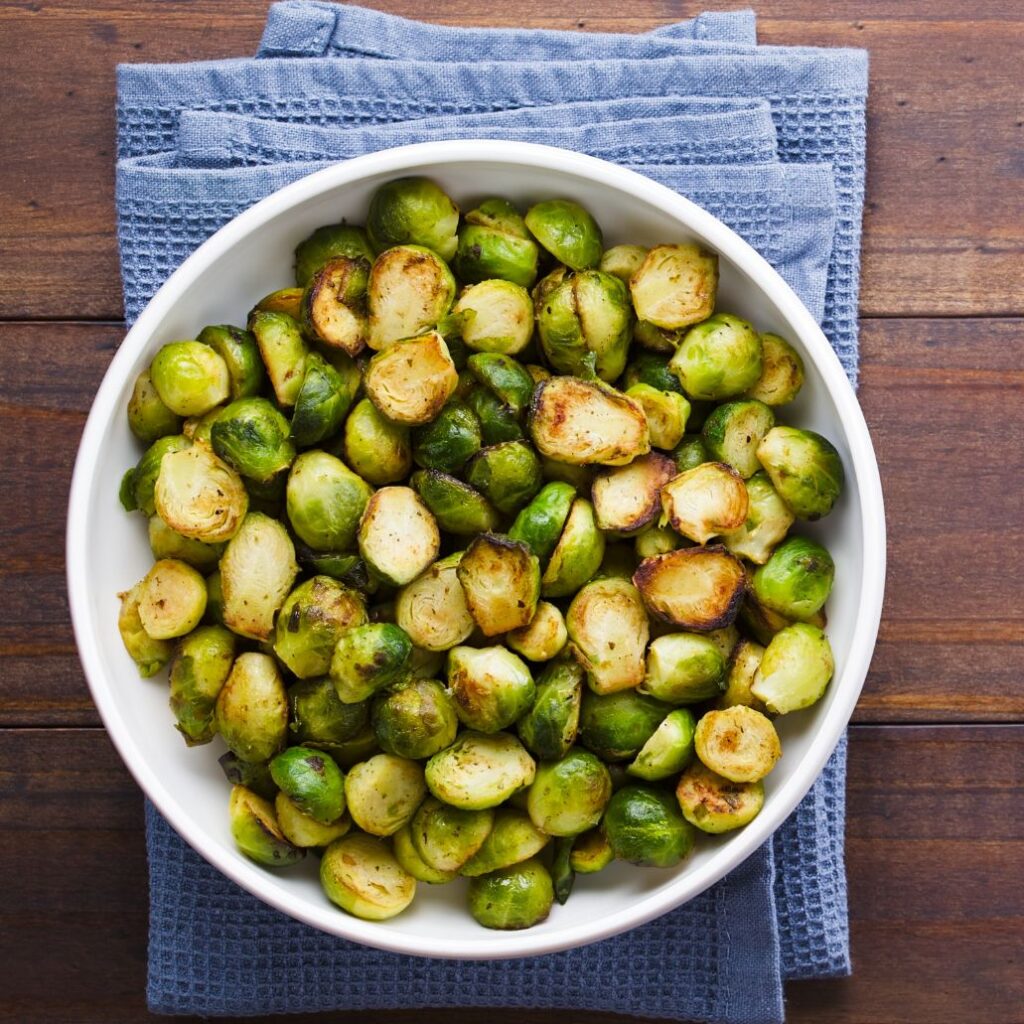Brussels sprouts are petite little cabbage that often get a bad rap. Some people find their distinct flavor unappealing, while others simply pass them by without a second glance. However, looks can be deceiving when it comes to nutrition! Though small in size, Brussels sprouts pack a substantial nutritional punch.
In this article, we will explore the health benefits of Brussels sprouts in more detail, backed by authoritative research and studies. So, let’s dive in and uncover the surprising truth about these nutrient-rich superfoods!
Nutrient Powerhouse
First up, Brussels sprouts are high in so many important vitamins and minerals. We’re talking:
- Vitamin K – essential for blood clotting and bone health. You get a whopping 156% of your daily value from just one cup!
- Vitamin C – supports immune function and collagen production. One cup contains 85% of the recommended daily C.
- Folate – crucial for cell growth and DNA development. Brussels sprouts are rockin’ sources of this B vitamin.
- Manganese – helps antioxidant enzymes work optimally. A single cup provides 15% of your daily manganese.
- Vitamin B6 – involved in over 100 enzyme reactions in the body. Brussels are solid plant-based sources of B6.
Cancer Prevention
Brussels sprouts are a cruciferous vegetable, belonging to the same family as broccoli, cabbage and kale. Cruciferous vegetables contain compounds called glucosinolates that break down into isothiocyanates once the vegetable is chopped or chewed[1] ↗. These isothiocyanates have been shown to help prevent cancer in lab studies.
Specifically, the isothiocyanates in brussels sprouts:
- Induce cancer cell death and inhibit tumor growth[2] ↗
- Limit formation of carcinogenic compounds[3] ↗
- Protect DNA from damage that can lead to cancer[4] ↗
Brussels sprouts may be especially helpful for reducing the risk of colorectal cancer due to the high levels of isothiocyanates they contain[5] ↗.
Heart Health
Brussels sprouts are a good source of folate, which plays an important role in heart health[6] ↗. They also contain soluble fiber that can help lower cholesterol levels and reduce high blood pressure risk factors for heart disease[7] ↗.
The nutrients found in these mini-cabbages includes:
- Fiber: Effective in lowering cholesterol levels, supporting cardiovascular function.
- Potassium: Regulating blood pressure and reducing the risk of stroke.
- Antioxidants: Combating inflammation and oxidative stress, promoting overall cardiac well-being.
One cup of cooked brussels sprouts provides 107% of the daily recommended value for vitamin K, which plays a role in blood clotting and protecting against arterial calcification that leads to heart disease[8] ↗.
Anti-Inflammatory Antioxidants
In addition to possible cancer-fighting properties, Brussels sprouts provide antioxidants that reduce inflammation in the body.
Antioxidants play a pivotal role in protecting our cells from oxidative damage. Brussels sprouts excel in this regard, boasting an impressive array of powerful antioxidants, including:
- Glucosinolates: Transforming into compounds like sulforaphane, with well-documented anticancer properties[9] ↗.
- Vitamin C: A formidable scavenger of free radicals, preserving cellular health.
- Vitamin A: A potent antioxidant that combats oxidative stress and supports skin health.
- Flavonoids: Working to reduce inflammation and oxidative burden within the body.
They also contain high levels of the antioxidant kaempferol, also found in broccoli. Kaempferol[10] ↗ is known to be anti-inflammatory and cardio-protective. It neutralizes damaging free radicals that cause chronic inflammation.
Detoxification and Liver Health
Finally brussels sprouts contain sulfur-containing compounds that can support the body’s natural detoxification processes. These compounds can help to neutralize toxins and support the liver, which is responsible for removing toxins from the body. In Addition, it contain glucoraphanin, which can help to protect against liver damage and promote liver health.
Summary
In summary, Brussels sprouts are a nutrient-rich superfood that can provide numerous health benefits. They contain cancer-fighting properties, anti-inflammatory benefits, and can support detoxification, liver health, and weight management. Additionally, they are an excellent source of vitamins and dietary fiber, making them a great addition to any healthy diet. So, don’t overlook these small, leafy greens the next time you’re at the grocery store, and start enjoying all the health benefits that Brussels sprouts have to offer!



